02/12/20
K-State Current - February 12, 2020
K-State Current is a weekly news update for the Kansas Board of Regents to apprise the Regents on a few of the many successes and achievements made by K-State faculty, staff and students.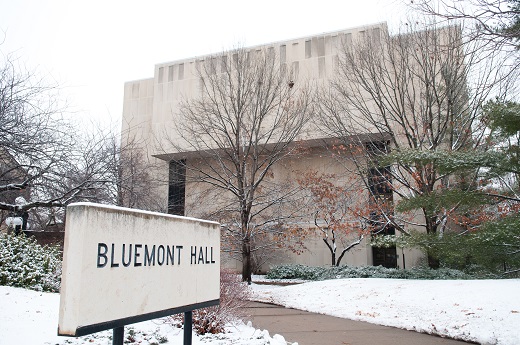
K-State News
Kansas State University named 2020 Top Employer by DiversityJobs.com
 Kansas State University has been named a 2020 Top Employer by DiversityJobs.com for its dedication and commitment to building a diverse workforce and culture.
Kansas State University has been named a 2020 Top Employer by DiversityJobs.com for its dedication and commitment to building a diverse workforce and culture.
"K-State continues to make progress in our efforts to attract and recruit a quality, diverse workforce," said Bryan Samuel, chief diversity and inclusion officer. "Being recognized as a top employer by DiversityJobs.com denotes that national thought leaders in diversity recruitment are taking notice of K-State's demonstrable commitment to diversity and inclusion."
DiversityJobs.com has hundreds of university clients, but only 43 have been named top employer in education for 2020. Kansas State University is the only higher education institution in the state of Kansas to be named a top employer. According to DiversityJobs.com, K-State has a proven dedication to diversity outreach.
"Through our work with Kansas State University over the last few years, we have been able to observe their commitment to reaching a diverse range of job seekers," said Brad Boggs, president of DiversityJobs.com. "This is critical because we find that a growing number of candidates prioritize employers who value workplace diversity. K-State's commitment to a diverse workforce and culture will no doubt position them to hire the best and brightest in Higher Education."
Carnegie Foundation endorses K-State for community engagement
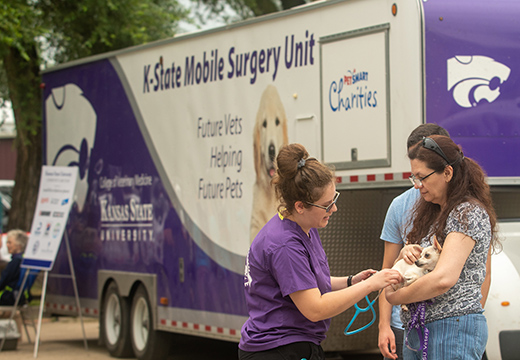 Kansas State University College of Veterinary Medicine's Shelter Medicine Mobile Surgery Unit provided basic veterinary services at the 2019 Everybody Counts event in Manhattan, Kansas. As an extension of its community engagement activities. Photo by Evert Nelson.
Kansas State University College of Veterinary Medicine's Shelter Medicine Mobile Surgery Unit provided basic veterinary services at the 2019 Everybody Counts event in Manhattan, Kansas. As an extension of its community engagement activities. Photo by Evert Nelson.
The Carnegie Foundation named Kansas State University as one of 119 U.S. colleges and universities to receive the 2020 Carnegie Community Engagement Classification for the university's commitment to community engagement. K-State is one of 75 institutions to be reclassified by the Carnegie Foundation this year.
This classification honors higher education institutions that demonstrate a dedication to collaborate at a local, state, national and global level to share knowledge and information. K-State first received this classification in 2010. A total of 359 institutions now hold the community engagement designation.
"Engagement is in the DNA of Kansas State University," said Charles Taber, provost and executive vice president. "It has been embraced since our founding as the first operating land-grant university and continues today through our numerous and varied community partnerships."
The university has more than 50 signature partnerships across its campuses and in numerous communities. Examples of some of the partnerships highlighted in the application include:
• Mobile Surgery Unit of the Shelter Medicine program in K-State's College of Veterinary Medicine visits regional animal shelters to provide on-site spay/neuter and medical triage within a two-hour drive of Manhattan.
• Project EXCELL: Extending College Enrichment for Lifelong Learning provides personal enrichment and life skills classes to adults 18 years and older with developmental disabilities.
• Science Communications Initiative strives to bring scientists and the community together to drive conversations about science and research. Key aspects include professional development opportunities for scientists to learn how to best communicate high-level, complex ideas as well as opportunities for the public to learn and engage with scientists in a relaxed setting.
In 2006 the university created the Center for Engagement and Community Development to enhance and broaden community partnerships. The center is the liaison for connecting university personnel and resources in the areas of economic development, community coaching, public health, entrepreneurship, arts development, environmental stewardship and community visioning. Additionally, the center is responsible for reporting on community engagement for the university.
"The Carnegie designation reinforces the engagement activities of the university and the commitment to continue," said David Procter, director of the Center for Engagement and Community Development. "I am so proud of K-State's administration, faculty, staff and students for daily efforts to work in partnership with our community partners to address the significant challenges faced by Kansans and communities worldwide."
K-State Faculty Highlights
Kate Wilkinson recognized as Professor of the Week
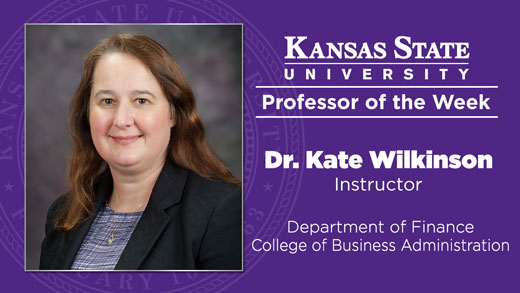 Kate Wilkinson, instructor of finance in the College of Business Administration, was recognized as Professor of the Week during the Feb. 3 men's home basketball game.
Kate Wilkinson, instructor of finance in the College of Business Administration, was recognized as Professor of the Week during the Feb. 3 men's home basketball game.
Wilkinson joined Kansas State University in 2016. As part of her teaching appointment, she teaches Principles of Finance. It is a required class for most students who come with diverse backgrounds and abilities and many consider it the most difficult class they take in the college. Despite this, Wilkinson has demonstrated a strong ability to connect positively with her students in the larger classroom environment while providing rigorous instruction. To get students more involved in the class, Wilkinson uses and has perfected the "Lecture Based Tutoring" system, developed by Todd Easton, the 2017-18 Coffman chair for university distinguished teaching scholars. Overall, an overwhelming number of students have expressed in their evaluations of her teaching that she genuinely cares about her students' success and goes out of her way to help when needed, even if it is outside of class time.
Wilkinson was selected by the college to receive the 2019 Ralph Reitz Outstanding Teaching Award.
The Professor of the Week recognition is coordinated by Faculty Senate, the president's office, K-State Athletics and the Division of Communications and Marketing. Recipients are faculty members selected by Faculty Senate caucuses. Those selected are provided tickets to a men's home basketball game of their choosing and are recognized during halftime. This is a small token of appreciation for those who teach at K-State.
New study changes understanding of protein biology in E. coli
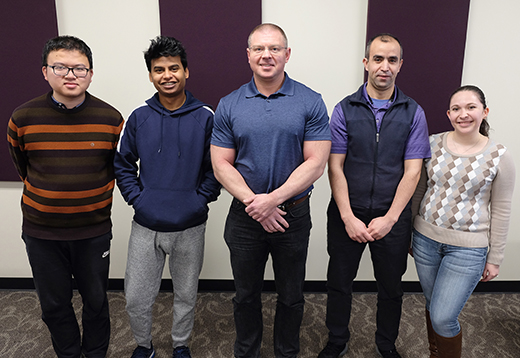 From left are members of the Hardwidge research team at Kansas State University: Congrui Zhu, doctoral student in pathobiology; Kamrul Hasan, doctoral student in pathobiology; Philip Hardwidge, microbiologist and biochemist; Samir El Qaidi, postdoctoral associate; and Kristina Eichhorst, master's student veterinary biomedical science.
From left are members of the Hardwidge research team at Kansas State University: Congrui Zhu, doctoral student in pathobiology; Kamrul Hasan, doctoral student in pathobiology; Philip Hardwidge, microbiologist and biochemist; Samir El Qaidi, postdoctoral associate; and Kristina Eichhorst, master's student veterinary biomedical science.
The conventional wisdom behind the biological activity of a group of E. coli bacterial proteins has been upturned by new research at the Kansas State University College of Veterinary Medicine.
Philip Hardwidge, a microbiologist and biochemist in the diagnostic medicine and pathobiology department, and Samir El Qaidi, postdoctoral associate, published the results of their newest investigations in the article "An intra-bacterial activity for a T3SS effector" in Scientific Reports.
"Bacterial pathogens interact with cells in their infected mammalian hosts by using what microbiologists call a type III secretion system, or T3SS, to inject virulence proteins into host cells," Hardwidge said. "In some strains of E. coli, the proteins that are secreted by the T3SS help the pathogen combat the host's immune system and contribute to diarrheal disease."
Previously, the T3SS effectors were thought to be inactive within bacterium and only function in the host cells. While performing mass spectrometry experiments, in collaboration with Nichollas Scott at the University of Melbourne in Australia, Hardwidge and his team received surprising data suggesting that one of these T3SS effectors might be active within the bacterium.
"We believe this is the first example of a T3SS effector functioning within both the bacterium and within the host cell," El Qaidi said. "This is important because it causes us to rethink whether this group of proteins has an additional function beyond what has been classically studied."
The researchers now want to understand both the extent to which the example they discovered might be common to other T3SS effectors in other organisms and also explore how these proteins may affect important aspects of bacterial physiology.
"I'm proud of the work performed by Dr. El Qaidi," Hardwidge said. "He took advantage of an unexpected observation, designed several clever experiments to test hypotheses about what might be happening, and conducted technically challenging bacterial genetics and biochemical experiments to confirm this new activity."
Hardwidge and El Qaidi also investigated the same effects in salmonella and C. rodentium, which are other bacteria that cause intestinal infections and diarrhea.
The project was supported by a grant from the National Institute of Allergy and Infectious Diseases to Hardwidge and by National Health and Medical Research Council of Australia project grants to Scott. Hardwidge's team also collaborated with Brian Geisbrecht, professor of biochemistry and molecular biophysics at K-State.
K-State Student News
Food science doctoral student receives prestigious scholarship
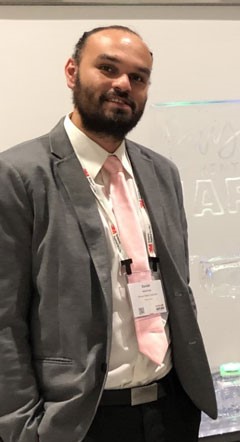 Daniel Vega, doctoral graduate student in food science, was recently awarded a $3,000 scholarship from the Food Marketing Institute, in collaboration with the Safe Quality Food Institute, that recognizes outstanding students enrolled in a university food and agricultural science program who are interested in pursuing a career in food systems auditing.
Daniel Vega, doctoral graduate student in food science, was recently awarded a $3,000 scholarship from the Food Marketing Institute, in collaboration with the Safe Quality Food Institute, that recognizes outstanding students enrolled in a university food and agricultural science program who are interested in pursuing a career in food systems auditing.
As production, processing, distribution and sales of food products continue to expand across global markets, food companies are required by customers, retailers and regulators to verify that they meet established standards for food safety, quality, environmental stewardship, animal welfare and other certification programs. Formally trained food systems auditors are relied upon to ensure that these diverse programs are operated effectively around the globe.
The Safe Quality Food program is recognized by retailers and food service providers around the world as a rigorous, credible food safety management system. It is the only certification system recognized by the Global Food Safety Initiative that offers certificates for primary production, food manufacturing, food packaging, distribution and retail/wholesale grocers. These auditing certificates enable suppliers to assure their customers that a specific food product has been produced, processed, prepared and handled according to the highest possible standards at all levels of the supply chain.
In addition to the cash award, Vega received an all-expense paid trip to San Antonio, Texas, where he attended the November 2019 Safe Quality Food International Conference to network with more than 850 food safety professionals.